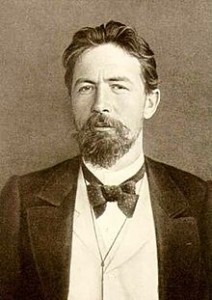Writing About Writing Part Two: Anton Chekov
I know, I know, I’m a day late on my blog post, but there were…extenuating circumstances. Anyway, I am glad to be back, ready to give you another quote about the fine craft of writing.
“Don’t tell me the moon is shining; show me the glint of light on broken glass.”–Anton Chekhov, abbreviated quote translated from a letter to his brother, Alexander
A renowned Russian playwright and author famed for his short stories, Anton Chekhov speaks here about perhaps the greatest of all writer maxims: “show, don’t tell.” Readers expect a considerable amount of detail that will allow them to fully envision what the writer wants to depict, and they want this detail to be interesting and creative rather than dull and cliché.

Chekhov was a master of description. (PD-1923)
Imagine you’re reading a Tom Clancy novel, perhaps a scene where a terrorist prepares to fire his weapon at the hero. Does the prose of the late, great Tom Clancy simply say, “The terrorist prepared to fire his gun” and leave it at that? Heck no! You can expect the novel to go into well-researched detail about the terrorist’s motivation, the specifications of the rifle he’s using, the amount of training required to become an expert shot with such a weapon, and so forth. Suddenly, what started as a bland, bare-bones sentence turns into a paragraph chock-full of juicy details, a description that gives the readers a wonderful picture of the scene and whets their appetites for the action to come.
Don’t mistake the desire for description for an excuse to use flowery prose. Readers don’t want to stumble their way through a page full of ten-dollar words and pretentious phrases. If it suits the nature of the scene to write, “The dog bit the man,” leave it at that. Don’t spend a page detailing the gush of blood, the frenzied look in the dog’s eyes, or the man’s screams of pains. Devote a paragraph, perhaps even two or three, to giving the intimate details of the attack, but no more. Too much description will bog down the flow of the scene and leave the reader setting your work aside in favor of some lighter fare.
So be on guard against simply telling the action in a boring fashion, but don’t be afraid to hold back unnecessarily fancy words like “vagaries” and “expunging” if the narrative allows. Find that sweet spot, and your readers will be in for a treat.



